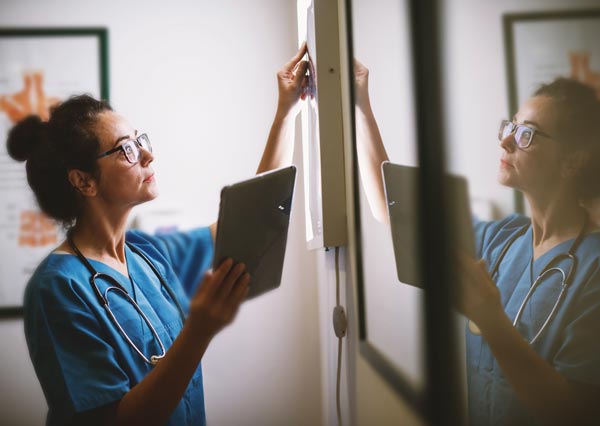ABOUT BOWEL CANCER
Tests and investigations
Your GP has referred you to a specialist for further investigation, and there may be a number of reasons why. Perhaps you were experiencing symptoms or you have a family history of bowel cancer.
Whatever the reason, your specialist will choose a test or investigation that is most appropriate for you and explain why. These procedures are outlined below.
Colonoscopy
A colonoscopy is an examination of the lining of your bowel to see if there are polyps or a cancerous tumour in the bowel. A long flexible tube (colonoscope) with a bright light and a camera on the end is inserted through your back passage and enables the doctor to get a clear view of the bowel. If the doctor sees anything that needs further investigation, photographs and samples (biopsies) can be taken for laboratory examination.
A colonoscopy does require preparation (laxative medications and dietary restrictions) prior to the procedure to ensure the bowel is empty. This allows the specialist to perform the examination effectively.
A specialist nurse will tell you what a colonoscopy involves and explain the bowel preparation you will need to undertake before the procedure. The nurse will ask you about any medical conditions (e.g. diabetes, kidney problems) that they need to be aware of prior to the bowel preparation.
Video courtesy of Mercy Hospital Dunedin.
Sigmoidoscopy (rigid and flexible)
Sigmoidoscopies can be done in an outpatient clinic and do not require anaesthesia or sedation.
A rigid sigmoidoscopy enables the doctor to look inside your rectum through an endoscope (like a thin, short telescope) that is passed into the back passage. With a flexible sigmoidoscopy, the doctor can look inside the rectum and into the lower part of the bowel.
If the doctor sees anything during this procedure that needs further investigation, samples (biopsies) can be taken and sent to the pathology laboratory for examination.

CT Colonography
CT colonography (also known as a ‘virtual colonoscopy’) is a reliable diagnostic tool for detecting bowel cancer and provides an alternative to a colonoscopy. This test uses a CT scanner to look for polyps and tumours inside the large bowel.
CT colonography can pick up cancers and large polyps that are thought to be more important than smaller ones. A colonoscopy is more efficient at detecting small polyps. CT colonography has a similar reliability for detecting cancers and pre-cancerous polyps.
Preparation to fully clean the bowel (laxative medication and some dietary restrictions) is required prior to this procedure and you will be given information about this. As part of the preparation, you will also be required to take a contrast drink to line the inside of the colon.
The majority of CT colonography is performed after a full cleansing of the bowel. For those who cannot tolerate a full bowel cleansing, a CT colonography can still be performed if the stool in the bowel is marked using a special drink taken with each meal prior to the scan. This may be appropriate for those who are elderly or who have multiple medical problems.
During the test, a short, thin tube is placed inside your rectum to fill your colon with air. The air will inflate and open the colon, helping to make any polyps or tumours easier to see. After the air has inflated the colon, you will go through a CT scanning machine which will take about five minutes.
The test is not painful but the gas used to inflate the colon can make you feel bloated, as if you have trapped wind. The procedure is generally more tolerable and has fewer risks than a colonoscopy.
If cancer or a pre-cancerous polyp is detected, a colonoscopy will be needed to biopsy the tumour and/or remove the polyp.
Some patients are concerned about excessive exposure to radiation from the CT scanner. The amount of radiation received from a CT colonography is similar to that we absorb from the atmosphere in one year.
Discuss with your doctor whether CT colonography is the right test for you.
Developed with the assistance of Dr Adrian Balasingham, Consultant Radiologist at Canterbury DHB and Christchurch Radiology Group.
